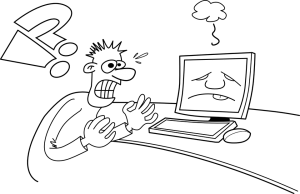Grateful for Self-Control
Never let the things you want make you forget the things you have. — Anonymous
Boy, would I like a new cell phone. Something faster, something shinier, something that doesn’t do the current “which-app-did-you-not-touch-but-I’m-going-to-open-anyway” shuffle.

Now, I could purchase the newest, currently released version of my phone, or I could wait for an updated and even jazzier one later this fall. Both options, monetarily, would cost me about the same, but the latter would be a better investment.
But do I really have the self-control to wait till autumn?
With a little gratitude, I might be able to.
In some of the more deceptive research I’ve read, participants were brought into the lab two at a time under the pretenses of doing a “lexical decision task;” that is, repetitiously and tediously looking at strings and strings of letters and determining if they were nonsense or English words.
And by now, the first deception has already happened: There was only one real participant; the other was an experimenter in disguise (i.e., a confederate).
Now, although the confederate “finished” the experiment without problem, right as the real participant was about to complete it, there came deception number two: his/her computer appeared like it crashed.
Soon thereafter, the lab-coated experimenter entered, saw the computer malfunction, and informed the participant of the third deception: the participant will have to wait for the technician to arrive, at which point, the participant will have to redo the entire experiment.
Who knew an academic study could have so much drama??
But wait—for once the experimenter leaves, the fourth and final deception came with a little kindness: The confederate, troubleshooting the issue herself, surreptitiously hit a button on the keyboard before pretending to wriggle a cord that fixed the computer.
Glory be! Glory be!
Relieved to be finished with most of the experiment, the actual participant completed a few more questionnaires (which included measures of gratitude) before being excused from the study.
Now, here’s where the effect occurs: Three weeks later, the participants were brought back into the lab under the pretenses of a completely unrelated study on self-control. Here, those same participants answered 30 questions similar to “If you had the choice between $10 today or $15 a week from today, which would you choose?”
Technically, the better choice would be the $15 in a week; however, because we crave to have things immediately, it requires self-control to exert that patience. (Just imagine the choice for yourself, which does your gut pull you toward?)
From a series of these self-control tests, the researchers found that those who demonstrated more gratitude three weeks prior—in a totally unrelated task!—exhibited significantly more self-control in this task. Thus, this research documents how people’s gratefulness toward occurrences in general predicts their ability at self-control in general.
Although this study is correlational (though a causal study did establish this psychological link, too), it demonstrates the broader point that the more grateful people are in their daily lives, the better they are at self-control—probably because they’re grateful for what they have already.
So when it comes to whether or not I should get a new phone? Well, I suppose I should just be grateful my phone has yet to randomly start playing the theme song to Game of Thrones in a meeting with my adviser (just kidding, it did that).
DUH-duh-duhduhDUH-duh-duhduhDUH
Gratefully,
jdt
Everyday Psychology: At what point does gratefulness become too much for its recipient? That is, surely you’ve encountered someone who thanks you too profusely. What is it that made their appreciation overdone?
Dickens, L., & DeSteno, D. (2016). The grateful are patient: Heightened daily gratitude is associated with attenuated temporal discounting. Emotion, 16(4), 421.










Pardon the plug, but another recent study connected humility with self-control success: http://socialpsychonline.com/2015/11/self-control-humility-humble/
Ooh, that’s a great post! The above link is a really good article for anyone who reads this comment. But speaking of humility/gratitude more broadly, the construct has really been popping up in research a lot lately and showing some really cool results. Now we just need Pablo to come up with a design for when gratitude is not beneficial.